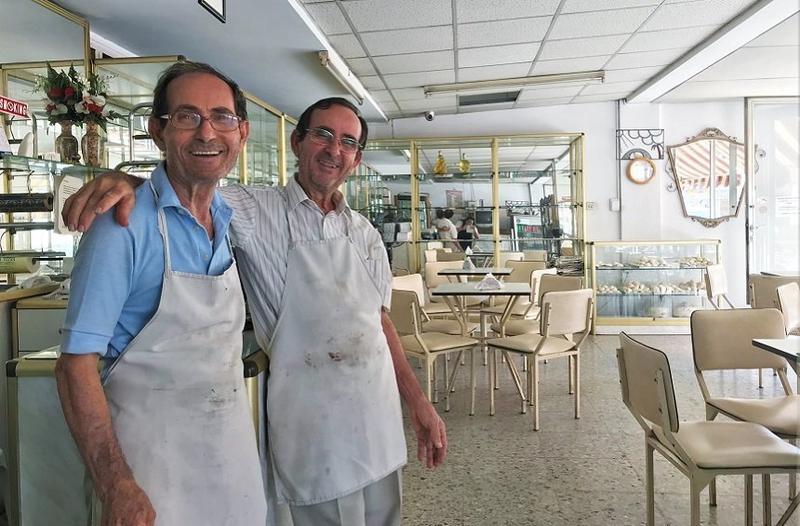
In a city like Limassol, bursting with memories, images, flavors and aromas, there are some places that inevitably become a living part of its history. One such place is Petit Paris, a patisserie that has been tempting Limassol locals with its delectable sweets for over half a century. More than just a familiar, beloved hangout, its longevity has turned the little shop into a real time machine. But though it has been a permanent fixture in Limassol for generations, no one has ever taken the time to chronicle the history of Petit Paris. Indeed, it took the appearance of a ‘For Sale’ sign to shake its customers into the realization that the things we take for granted do not necessarily last forever.
Petit Paris is the only living testament to what was once the heyday of Gladstonos Street. In the 1960s, this lively street was the hotspot for afternoon strolls, Saturday night dancing, and flirtatious dates. Brothers Theodoros and Andreas Charalambous, who were once the ‘odd job boys’ at the patisserie, took over as owners (as successors of the original owner, Takis Nicolaou) and have been behind the counter of Petit Paris for 54 years, working seven days a week, 15 hours a day. They are an integral part of the city’s lively history and have certainly played a small role in the everyday lives of the thousands of Limassol locals who entered their shop.
For most Limassolians, the name Petit Paris brings back fond memories of a time of carefree innocence. For these two siblings however, it has become inextricably entwined with their lives in both a positive and negative way. Though Theodoros and Andreas are deeply attached to their shop, feeling joy through their work and creativity, it wasn’t necessarily the best option for either of them. We spoke with Theodoros, one of the owners, who explained that he did not have much choice when it came to working there. As he explains, he was a good student who could have gone on to high school, if he hadn’t been so deeply traumatized by one of his teachers.
“He was something else, this teacher. He once caught us peeping into his office to see how badly he would beat these students he had taken in there. In the end, we all ended up getting a beating, and a harsh one at that. He once beat me because I put down a bucket meant for watering the garden, simply because my classmate who was holding it with me left to go to the restroom. If the teachers hadn’t been this way, I may have ended up finishing school,” he recalls.
Theodoros and Andreas grew up in Parekklisia. Times were tough, and as neither of them were planning on continuing their studies, they had to find work. Theodoros, who is 66 years old today, remembers himself doing the same job since he was 12 years old. The work starts early in the morning, around 7, and ends after 8 in the evening. “If I don’t have anything else to do in the morning, I might come earlier, too”, says Andreas Charalambous, indicating that their lives do turn around this patisserie.
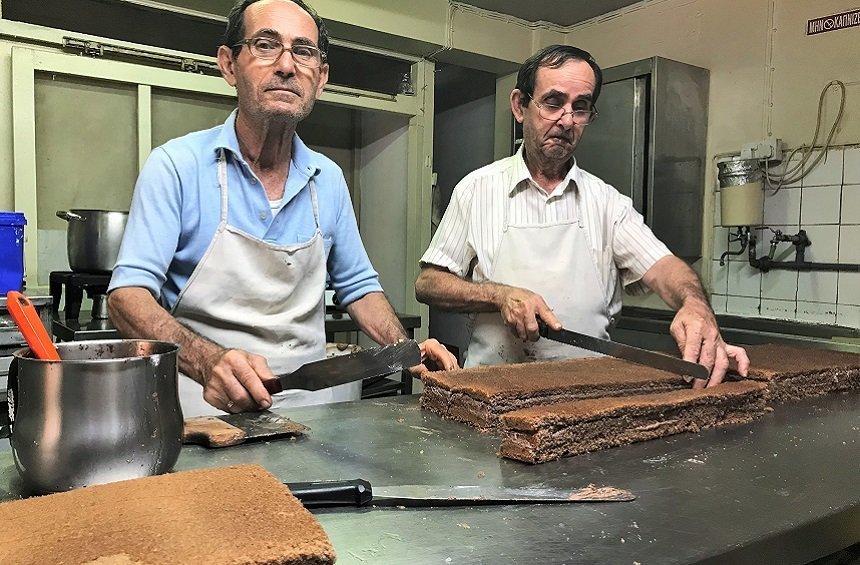
Andreas originally worked at Ymittos patisserie in Famagusta, which belonged to an uncle of his. Around 10 years later, that uncle arrived in Limassol as a refugee and he reopened his patisserie, by the name of Ymittos, to remind him the one he had left behind.
Many years have gone by since then, and he’s since been blessed with children and grandchildren. But it wasn’t until 2017 that he was finally able to scale back his work week to six days. He can barely contain his tears as he recalls with bitterness and sorrow all the things he was forced to deprive his children of as a result of this work.
“I will never forget how every summer, they would say to me ‘Dad, everybody’s going to the beach. When are you going to take us?’ I never could take them to the beach, the way all the other parents did,” Theodoros says, tears brimming in his eyes and voice cracking.
“Their mother always advised them to study hard and go to university so they will never have to follow in their father’s footsteps, working away from home for so many hours and never seeing their families,” he adds. Theodoros thus feels relieved that today, all his children have university degrees and office jobs, with a suitable timetable which allows them to spend time with their own families.
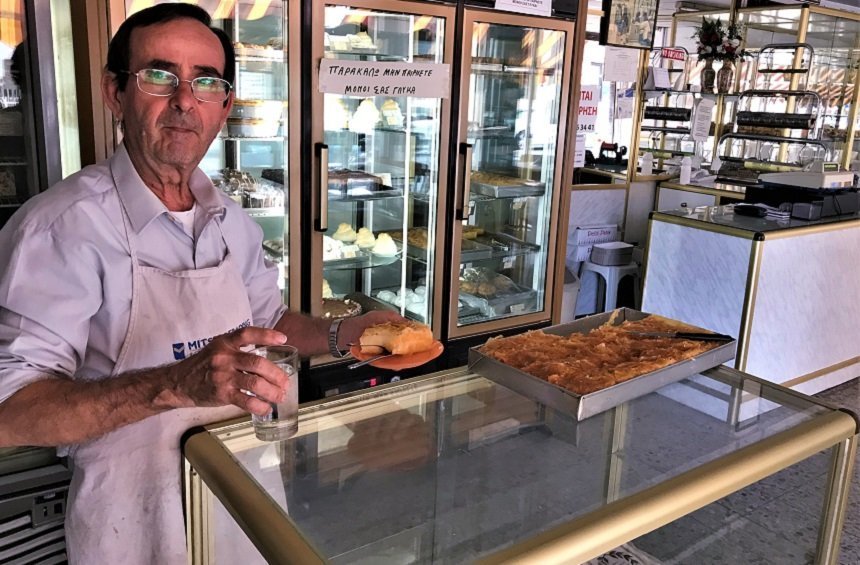
The ‘galatoboureko,’ or ‘custard pie’ is one of Petit Paris’ most famous desserts, doubly enjoyed by those lucky enough to catch one fresh out of the oven.
Two years ago, Theodoros and Andreas decided to place a ‘For Sale’ sign on the last traditional patisserie on historic Gladstonos Street, in a neighborhood that was once bursting with pastry shops, coffee shops, and entertainment venues. Today, Gladstonos Street offers a distinctly different vibe, choked with cars and traffic, with only Petit Paris remaining as a surviving vestige of the past. But though Theodoros is looking forward to finally getting some much needed rest, he does not want to see his shop fall to disrepair.
“I would much rather it remain a patisserie or confectionery shop, so that I may pass by and remember all those years I spent here,” says Theodoros, who is already witnessing with sorrow the many changes that have befallen the once buzzing Gladstonos Street.
The news about the sale of the shop made waves across Cyprus in 2016. “We would get up to 10 phone calls per day at the beginning. Of course, two years down the line, these have somewhat decreased.” None of these enquiries came to fruition however, and this is quite a good indication of how nostalgia for the past doesn’t always translate to real love and concern for the preservation of the city’s history.
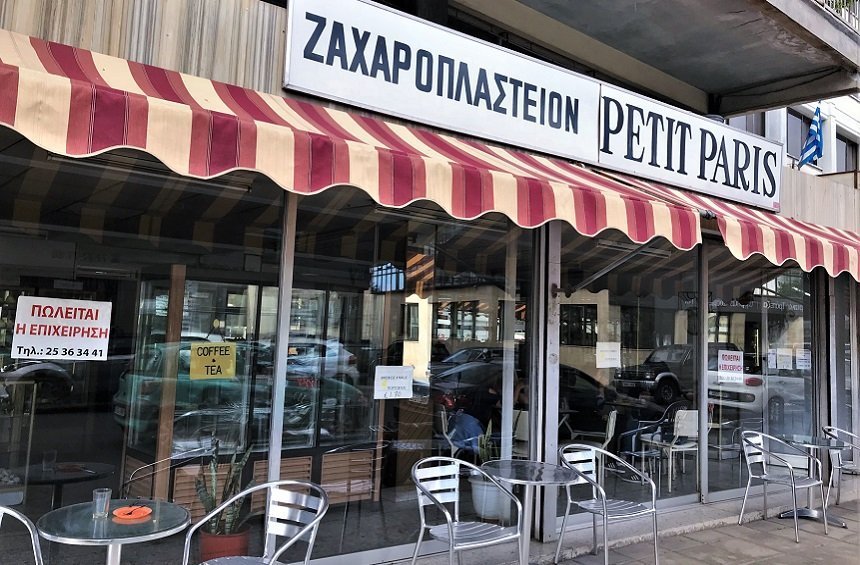
In 2016, the “For Sale’ sign appeared in Petit Paris’ shop windows, sending shock waves across Limassol and beyond, as people began to realize that a significant piece of Limassol history was about to disappear, without a single trace.
“Everyone thinks that we have declared bankruptcy, and they want to take advantage of us and buy our shop at the lowest possible price. This is not true, however. And we cannot possibly sell a shop full of equipment and facilities, bought and installed mere years ago, at such prices,’ explains Theodoros.

The bicycle which once made the rounds in Limassol to deliver Petit Paris’ delectable sweets was finally laid to rest outside the shop, and became one of the area’s most recognizable landmarks. It was stolen in 2014 and its traces completely lost since then. (Photo: Constantinos Neophytou)
And so, this historic little confectionery shop trudges on, as though existing in a period of transition. Theodoros and Andreas are still there, counting down the days as they make their irresistible galatoboureko, their famous chocolate cake, and the delicious kataifi, desserts that have made Petit Paris famous well beyond the borders of Limassol.
As long as the brothers remain behind the counter, Petit Paris will continue to be a living museum, one where the ‘exhibits’ are delicious moments that disappear in an instant, and where memories abound. For a shop that has been around for so many decades, it sure has some tales to share of incidents which took place within its walls – and a great many humorous ones at that.
This tribute by All About Limassol (part of the largest online archive that preserves the History of Limassol - check here) is an attempt to record and preserve these tales that make up our city’s collective memory, some of which are still easily recalled by those who have lived through them. Because the bitter truth is that, no matter how many memories people in Limassol have from this patisserie, the documents, information and photos that will be able to preserve its memory in the future, when the people will be long gone, when the streets will be changed and when Petit Paris will no longer exist, are very few to none.

The striped tent, the metal chairs (same as the one’s the patisserie used originally, with the cushions being the only parts of it that changed), the artistic mirror, make the patisserie a natural vintage landscape, just like a living museum of the city’s history.
Theodoros grins widely as he recollects a time during the glory days of Gladstonos Street, when a young couple would meet clandestinely in the shop’s attic, and once found themselves in a bit of a bind.
“So one day, the father of this girl, who was seeing this young man, visited the store with his younger daughter,” he begins to narrate. “The little girl insisted on going upstairs to the attic, and before anyone could stop her she ran up the steps. Her father ran up behind her and, of course, came face to face with his elder daughter caught in a tender moment with her date.”
Humorous or solemn, usual or unusual, these tales of incidents which took place in the patisserie over a period of half a century have become a part of the life and culture of Limassol. Unfortunately, photos from the shop’s past are few and far between, perhaps because it never occurred to the customers who frequented Petit Paris to document this local heirloom, or perhaps because the brothers were simply too busy running their shop to take pictures of it.
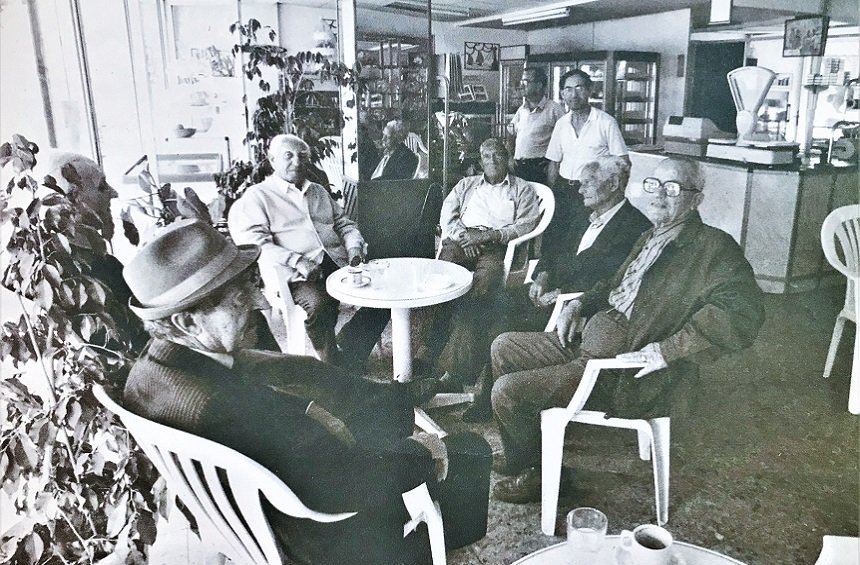
One of the few surviving photographs of the shop from previous decades is the one that had been used in a magazine tribute in the mid-1990s.
The love for this famous, timeless hangout on Gladstonos Street continues strong to this day, and it is a love that Theodoros and Andreas witness daily. Besides the older folk, who have never stopped visiting the shop and even organize anniversary meetings there, there are also the younger generations which have become zealous fanatics of Petit Paris’ sweets. And though the shop may not be the hotspot for today’s twentysomethings, one can still find groups of young people frequenting there, following in the footsteps of their parents and grandparents.

A photograph of the famous Petit Paris chocolate cake uploaded to social media led to an anniversary visit by friends and classmates who once frequented the shop regularly.
Despite the difficulties and hardships they encountered over the past 54 years, the decision to give up Petit Paris was not an easy one for the owners. A determining factor, however, was the need to feel some of the normalcy they would see in their customers who would come in and enjoy a carefree piece of cake with their friends, or pick up sweets to take to parties and get-togethers.

The famous chocolate cake (for which there orders coming in the patisserie from all over the island) is still made in the same way Andreas and Theodoros were taught to make it, without any changes in the recipe or the procedure, which is evident in its taste – which applies for any other cake in the place, too.
“We are pensioners now, and we want to relax and spend time with ourselves, our children, and our grandchildren,” says Theodoros, a note of complaint creeping into his voice. “Everyone asks me what I will do all day if I stop working, but I just say well, was it that difficult for all these people to find something to do with their time? Why shouldn’t I enjoy a walk on the beach like other people?” he adds.

Younger generations are drawn, almost as if by magic, to the confectionery shop, turning it into their new hangout and thus giving historical continuity to this unique spot in Limassol.
The 2 brothers dedicated their lives to a single goal, creating a destination which offered the city and its people many delights, even drawing hundreds of visitors from across the island to Limassol. This dedication, combined with their hard work, enthusiasm, and the high quality of their work makes Theodoros and Andreas Charalambous examples of true Limassolians, the kind who make this city more beautiful each day. These are the people who will always have a special place in the tributes of All About Limassol (the Official Source for Promoting Limassol in Cyprus and Abroad). These are the people who have added their own tale to Limassol’s rich history, and by doing so, written their own story in Limassol.
Extra tip: The name of Petit Paris – leaving the mark of French confectionery art and finesse in Gladstonos Street – had already made it clear in the beginning of the 1960s, that a city like Limassol was truly cosmopolitan and it would inevitably grow stronger and larger in the future.
* NOTE: The tributes of the Project "History of Limassol" present information that has emerged from historical research thus far. Any new data is embedded into the tributes, once it has been confirmed.